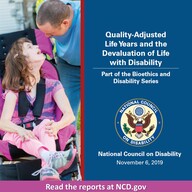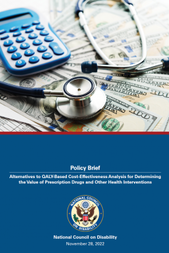HHS’ Finalizes the Regulations on Section 504 of the Rehab Act Clarifying Rules for Nondiscrimination
The U.S. Department of Health and Human Services (HHS) announced the final rule governing Section 504 of the Rehabilitation Act, which protects the rights of people with disabilities in programs and activities receiving federal financial assistance. As described in the final rule, the new regulations would bar health care decisions made using measures that discount gains in life expectancy, which would likely include the quality-adjusted life year (QALYs) and the combined use of QALYs and equal value of life years gained (evLYG). HHS’ rule represents a critical step forward to protecting patients and people with disabilities and sends a strong message that we need better solutions for U.S. decision-making that don’t rely on the biased, outdated standards used by payers in the U.S. and other countries. PIPC expressed appreciation for the agency’s broad interpretation of what constitutes the discriminatory use of value assessment in its description of the rule.
Disability Advocates Respond to Proposed Rule on Health Care Nondiscrimination
Recently, the Department of Health and Human Services (HHS) proposed to strengthen prohibitions against discrimination on the basis of disability in health care. Disability advocates banded together to comment on the proposed rulemaking and to call upon HHS to take additional action in banning discriminatory metrics. Read what the experts are saying about this vitally important effort.
80 Organizations Urge HHS Civil Rights Office to Ban QALYsPIPC joined over 80 organizations in signing a letter to the HHS Office for Civil Rights commenting on the proposed rule implementing Section 1557 of the Affordable Care Act. The groups support a comprehensive proposed rule seeking to strengthen civil rights protections in federally funded health programs and HHS programs and agreed that the ability to access needed health care fully and free from discrimination is critical and requires action to support and strengthen existing nondiscrimination laws.
|
Incorporating Patients into Value Assessment for Novel Cell and Gene TherapiesAround the globe, various health technology assessment and value assessment organizations are attempting to estimate the health and economic value of new novel cell and gene therapies to better inform healthcare decision making. These organizations most commonly employ cost-effectiveness analysis, which seeks to determine whether the costs of a given therapy are justified by its benefits; that is, whether it is a “good buy.”
|
30 Leading Stakeholders Join PIPC in Urging HHS to Step Up Nondiscrimination EffortsPIPC proudly joined 30 leading disability rights and racial justice organizations in a letter to the Department of Health and Human Services' Office of Civil Rights that calls for additional regulatory action aimed at preventing discrimination in health care. In particular, the letter calls on HHS to formally issue its Information (RFI) on “Discrimination on the Basis of Disability in Critical Health and Human Service Programs or Activities.”
|
Where We Stand on Value FrameworksAlthough labeled as “value frameworks,” ICER and others do not always accurately assess what patients value. In fact, they often are in conflict with stakeholder efforts to move towards a more patient-centric health care system and advance access to personalized and precision medicine.
|
NCD Report: Quality Adjusted Life Years and the Devaluation of Life with a DisabilityThis report from the National Council on Disability (NCD) focuses on how the historical and continued devaluation of the lives of people with disabilities by the medical community, legislators, researchers, and even health economists, perpetuates unequal access to medical care, including life- saving care.
|
Don't Let Payer Investments in QALYs Undermine California's Health Equity GoalsChairman Coelho acknowledged ongoing policy efforts led by payers in California with implications for entrenching the use of discriminatory metrics in health care. He urged California policymakers not to ignore the recommendations of so many disability rights leaders on this issue and to be skeptical about the ability of ICER to make fair health care recommendations. Click here to read the blog post.
|
Alternatives to QALY-based Cost Effectiveness Analysis for Determining the Value of Prescription Drugs and Other Health InterventionsThis brief from NCD highlights alternatives to standard CEA: augmented or extended traditional CEA; multi-criteria decision analysis; frameworks for determining value to individual patients; and organizations conducting value assessments or advancing methodologies outside QALY-based CEA. The brief then offers recommendations to avoid the use of QALY. Click here to read the report.
|
PIPC Responds to ICER's evLYG MetricThose who are wed to traditional cost-effectiveness assessments have posited an untenable choice between two flawed metrics: the QALY, which incorporates some measures of value reflecting quantity and quality of life, but discriminates against patients and people with disabilities, or the “equal value of life year gained,” the evLYG, which disregards any value of a medicine other than its ability to extend life. Chairman Coelho stated, “Rather than resigning to pick between two measures that all agree fall short, and in turn hinder any lasting improvements value assessments can achieve or its utility for patients and our health care system, we must commit to a better path forward.” Click here to read the blog.
|
Formulary Restrictions Devalue And Endanger The Lives Of Disabled People"As policymakers around the world seek to manage rising drug expenditures, people with disabilities find ourselves increasingly concerned by the potential harms that cost-cutting measures may bring. The growing fight between health care purchasers and drug manufacturers offers yet another instance where people with disabilities and chronic conditions may find themselves caught in the cross-fire." Click here to read Ari Ne'eman's PIPC Patient Blog.
|
Coelho Pens Letter to NASEM on Preliminary Framework for Equitable Allocation of COVID-19 VaccineChairman Coelho a personal letter to the National Academies of Sciences, Engineering, and Medicine to amplify the comments submitted by the disability community in response to the Discussion Draft of the Preliminary Framework for Equitable Allocation of COVID-19 Vaccine, commissioned by the Centers for Disease Control and the National Institutes of Health. He stated, "In my experience as a longtime disability rights advocate and an original of the Americans with Disabilities Act, I view this as a process that is aligned with our mantra of 'Nothing About Us Without Us' and therefore urge you to outreach directly to our disability community as you wrestle with difficult questions related to vaccine allocation even after the comment deadline.” He highlighted letters submitted by the Consortium for Citizens with Disabilities, the Association of University Centers on Disabilities, the American Association of People with Disabilities, and Not Dead Yet.
|
Responding to Stakeholder Input: Finding the Patient Voice in ICER's Value AssessmentsPIPC has partnered with Xcenda to quantify the extent to which ICER incorporates stakeholder input in its final assessments, particularly patients. Upon review of submitted comments, and comparing those comments to ICER’s final value assessments, Xcenda was able to quantify that patient perspectives were half as likely to be incorporated than other stakeholders. The report bolsters the argument that ICER needs to take steps to improve not only its process for engagement, but also its consideration of input received from patients.
|
STAT News: Facing Criticism, CVS May Modify Its New Cost-Effectiveness Program for Covering Some DrugsAn article in STAT News notes that CVS may consider changes to its new cost-effectiveness program as a result of backlash from over 90 leading advocacy organizations representing patients, people with disabilities, physicians, and caregivers. Spearheaded by the Partnership to Improve Patient Care (PIPC), stakeholder groups criticized CVS Caremark’s decision last month to incorporate the Institute for Clinical and Economic Review’s (ICER)”quality-adjusted-life-year” metric in some of its coverage choices. “From a clinical care perspective, QALY calculations ignore important differences in individual patient’s needs and preferences,” the letter states. “From an ethical perspective, valuing individuals in ‘perfect health’ more highly than those in ‘less than perfect’ states of health, is deeply troubling.” Dr. Troyen Brennan, a CVS executive vice president and chief medical officer, responded to the letter saying that “It behooves us to spend some time to understand the concerns of the disability community and, if necessary, modify the measures so the process treats every life as being of equal value. We’ll go with the program we have now, but we’re looking for ways that we might modify it down the line.”
|
Washington Examiner: Patient Groups Urge CVS Health to Drop Program Targeting Costly DrugsAn article in the Washington Examiner highlights the Partnership to Improve Patient Care's (PIPC) recent letter to CVS Caremark, which voices opposition to CVS' use of quality-adjusted-life-year metric. Joined by over 90 stakeholder groups, PIPC criticizes CVS for ignoring important differences among patients while relying on a flawed one-size-fits-all assessment. "Cost-effectiveness analysis discriminates against the chronically ill, the elderly and people with disabilities, using algorithms that calculate their lives as 'worth less' than people who are younger or non-disabled," the letter states.
|
BioPharma Dive: Patient Groups Attack CVS Use of ICER Metrics, Urge RethinkAn article in BioPharmaDive highlights the latest pushback on efforts to establish quantitative frameworks for valuing medicines. These efforts, spearheaded by the Partnership to Improve Patient Care (PIPC), criticized CVS Caremark’s decision last month to “incorporate value-based drug pricing analyses in some of its coverage choices.” The letter, composed by many prominent groups including the American Association of People with Disabilities, the National Alliance on Mental Illness, and Vietnam Veterans of America, argues that their “main issues with ICER’s framework are not new and mirror some of the criticisms laid out by the drug industry’s trade lobby PhRMA. The article highlights that Tony Coelho, President of PIPC and former Congressman who led efforts to pass the Americans with Disabilities Act, took a strong stance on CVS’ decision characterizing it as an “outdated policy that has no place being referenced as a value-based initiative.”
|
BioCentury: Patient Groups Urge CVS to Reconsider ICER-Restricted FormularyAn article in BioCentury highlights the Partnership to Improve Patient Care (PIPC)’s recent letter to CVS Health Corp, which voices the importance of a reconsideration of a new formulary that would be restricted to drugs deemed cost effective by the Institute for Clinical and Economic Review (ICER). This formulary, the article states, would “allow clients to exclude from their plan any drug with a launch price that exceeds a cost-effectiveness ration of $100,000 per-quality adjusted life year (QALY) gained as determined by ICER.” The letter, composed by 94 patient groups and individuals, criticized ICERS’s cost effectiveness analysis by arguing that cost effectiveness inherently ignores existing differences among patients. “CVS spokeperson Christine Cramer told BioCentury that the firm believes as more PBM clients adopt such programs, manufacturers will begin to moderate lunch prices,” the article states.
|
'Patient Voices' on Value FrameworksIn response to CMS’ recently proposed Medicare Part B drug demonstration, dozens of individual patients and patient advocacy groups have mobilized to voice their concerns with the model’s use of "comparative effectiveness" research and "cost-effectiveness" data to make coverage decisions. Indeed, patients have expressed a wide range of concerns – from the reliance on assessments such as those generated by the Institute for Clinical and Economic Review (ICER), to the lack of patient engagement in the development of the new reimbursement model.
|
PIPC Patient Blog: Donna CryerIn a recent post for the PIPC Patient Blog, liver transplant and IBD patient Donna Cryer examines the implications of shifting health policy landscape that promises to reward “value” in care rather than “volume” of services. As she explains, "It is unacceptable when payers, instead of patients and providers, use [comparative effectiveness] reports to drive clinical decision-making based on mathematical assessments of so-called 'average value' – although I’ve never met an 'average' patient. It is even more frustrating to think that public programs could sidestep patient protections embedded in the Medicare law through a nationwide 'demonstration project' that would allow these assessments to define treatment value."
|













